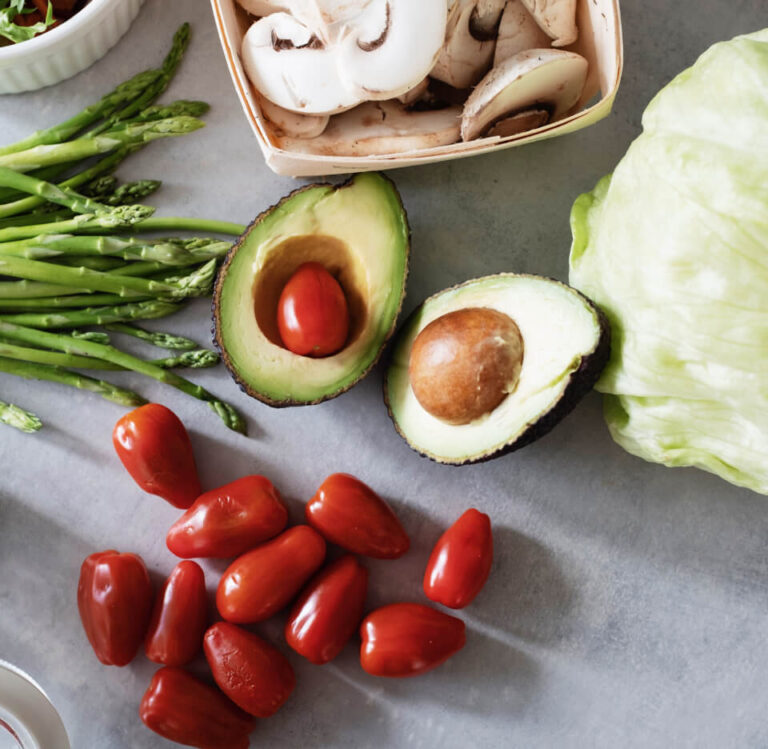Are you looking for a delicious way to enhance your gut health? Fruits are nature’s sweet gift, packed not only with vitamins and minerals but also with fiber that works wonders for your digestive system. In a world where gut health is increasingly recognized as the cornerstone of overall well-being, incorporating high-fiber fruits into your diet can be a game-changer. From juicy berries to tropical delights, the right fruits can promote regularity, ease bloating, and even support beneficial gut bacteria. In this article, we’ll explore the top 10 high-fiber fruits that you can easily add to your meals or snack on throughout the day. Discover how these flavorful options can naturally boost your gut health, elevate your energy levels, and transform your overall wellness. Let’s dive into these fiber-packed powerhouses and embrace a healthier, happier gut together!
Understanding Gut Health and Its Importance
Gut health is an increasingly popular topic in the wellness community, and for good reason. The gut is often referred to as the “second brain” because of its significant impact on our overall health and well-being. It contains trillions of bacteria, viruses, and fungi, collectively known as the gut microbiome. These microorganisms play a crucial role in digesting food, absorbing nutrients, and even regulating our immune system.
A healthy gut can influence everything from our mood to our weight. When the gut microbiome is balanced, it supports proper digestion, enhances nutrient absorption, and protects against harmful pathogens. Conversely, an imbalance in gut bacteria can lead to issues such as inflammation, fatigue, and chronic diseases.
Recognizing the importance of gut health can be the first step toward improving it. Whether you’re looking to alleviate digestive discomfort, boost your immune system, or enhance your overall health, focusing on your gut can yield significant benefits. One of the most effective ways to nurture your gut is through your diet, specifically by incorporating high-fiber fruits.
The Role of Fiber in Digestive Health
Fiber is a type of carbohydrate that the body cannot digest. Unlike other carbs, which are broken down into sugar molecules, fiber passes through the body undigested. It comes in two forms: soluble and insoluble. Soluble fiber dissolves in water to form a gel-like substance, which can help lower blood glucose levels and cholesterol. Insoluble fiber does not dissolve in water and is beneficial for adding bulk to the stool, which aids in regular bowel movements.
Fiber is essential for maintaining a healthy digestive system. It aids in moving food through the digestive tract, preventing constipation, and promoting regularity. Moreover, fiber serves as a prebiotic, which means it provides nourishment for the beneficial bacteria in our gut.
By improving the health of the gut microbiome, fiber can support the production of short-chain fatty acids that reduce inflammation and boost immune function. Additionally, a fiber-rich diet can help prevent digestive disorders, such as diverticulitis, hemorrhoids, and irritable bowel syndrome.
Benefits of High Fiber Fruits for Gut Health
High-fiber fruits are a delicious and natural way to boost your fiber intake and support gut health. These fruits are not only rich in fiber but also packed with essential vitamins, minerals, and antioxidants that contribute to overall health.
Consuming high-fiber fruits can help maintain regular bowel movements and prevent constipation. The fiber in these fruits aids in adding bulk to the stool and promoting its movement through the digestive tract. This, in turn, reduces the risk of developing hemorrhoids and other digestive issues.
Moreover, high-fiber fruits act as prebiotics, feeding the beneficial bacteria in your gut. A healthy gut microbiome is associated with improved digestion, better immune function, and a lower risk of chronic diseases. By incorporating these fruits into your diet, you can support a balanced gut microbiome and enjoy a healthier digestive system.
Top 10 High Fiber Fruits for a Healthy Gut
1. Raspberries
Raspberries are a powerhouse of fiber, with one cup providing about 8 grams of dietary fiber. These vibrant berries are also rich in vitamins C and K, as well as antioxidants that combat oxidative stress.
2. Pears
Pears are another excellent source of dietary fiber, with a medium-sized pear containing about 6 grams. They are also packed with vitamin C and potassium, making them a nutritious addition to your diet.
3. Apples
An apple a day may indeed keep the doctor away, especially when it comes to gut health. Apples contain about 4 grams of fiber per medium fruit and are rich in pectin, a type of soluble fiber that acts as a prebiotic.
4. Bananas
Bananas are not only a convenient snack but also a great source of dietary fiber, with about 3 grams per medium banana. They also contain resistant starch, which acts as a prebiotic and supports gut health.
5. Oranges
Oranges offer about 3 grams of fiber per medium fruit and are well-known for their high vitamin C content. The soluble fiber in oranges can help lower cholesterol and regulate blood sugar levels.
6. Kiwi
Kiwi is a small fruit with a big nutritional punch, providing about 2 grams of fiber per fruit. It is also rich in vitamins C and E, potassium, and antioxidants.
7. Blackberries
Blackberries are another fiber-rich berry, with one cup containing about 7.6 grams of fiber. They are also loaded with vitamins C and K, as well as antioxidants that support overall health.
8. Avocados
Avocados are unique among fruits for their high fiber and healthy fat content. One medium avocado provides about 10 grams of fiber, along with essential nutrients like potassium and folate.
9. Figs
Figs are a sweet and satisfying fruit that offers about 1.6 grams of fiber per medium fig. They are also rich in vitamins A and K, calcium, and potassium.
10. Prunes
Prunes, or dried plums, are well-known for their digestive benefits. They provide about 3 grams of fiber per serving and contain sorbitol, a natural laxative that helps alleviate constipation.
Nutritional Profiles of Each Featured Fruit
Raspberries are not only high in fiber but also low in calories, making them an excellent choice for weight management. They contain anthocyanins, which have anti-inflammatory properties, and are a good source of manganese, which supports bone health.
Pears are hydrating fruits, with a high water content that aids in digestion and prevents dehydration. They also contain boron, a mineral that helps the body retain calcium, thus supporting bone health.
Apples are rich in quercetin, a flavonoid that has anti-inflammatory and antioxidant effects. They also provide a good amount of vitamin C, which supports immune function and skin health.
Bananas are an excellent source of vitamin B6, which is crucial for brain health and the production of serotonin. They also provide magnesium, which supports muscle and nerve function.
Oranges are well-known for their vitamin C content, which supports immune health and skin repair. They also provide folate, which is important for DNA synthesis and cell division.
Kiwi is rich in vitamin E, which has antioxidant properties and supports skin health. It also contains actinidin, an enzyme that aids in protein digestion.
Blackberries provide high levels of vitamin K, which is important for blood clotting and bone health. They also contain ellagic acid, an antioxidant that may have anti-cancer properties.
Avocados are a great source of monounsaturated fats, which support heart health. They also provide lutein, an antioxidant that is beneficial for eye health.
Figs are high in calcium, which supports bone health, and potassium, which helps regulate blood pressure. They also provide a good amount of iron, which is important for oxygen transport in the blood.
How to Incorporate High Fiber Fruits into Your Diet
Adding high-fiber fruits to your diet can be both easy and enjoyable. Start your day with a fiber-rich breakfast by adding berries to your cereal or yogurt. You can also blend fruits like bananas, kiwi, and raspberries into a smoothie for a nutritious start to your day.
For a fiber-packed snack, keep fresh fruits like apples, pears, and oranges on hand. These fruits are easy to carry and can be enjoyed on the go. If you prefer dried fruits, opt for prunes or figs, which are convenient and have a longer shelf life.
Incorporate high-fiber fruits into your meals by adding them to salads, oatmeal, or grain bowls. For example, top your salad with slices of avocado and blackberries, or add diced pears and apples to your oatmeal. You can also use fruits like figs and bananas in baking to add natural sweetness and fiber to your recipes.
Delicious Recipes Featuring High Fiber Fruits
Raspberry and Kiwi Smoothie
- Blend together 1 cup of raspberries, 2 peeled kiwis, 1 banana, 1 cup of spinach, and 1 cup of almond milk. Enjoy this refreshing smoothie for a fiber-rich breakfast or snack.
Pear and Blueberry Salad
- Combine mixed greens, sliced pears, fresh blueberries, crumbled feta cheese, and walnuts. Drizzle with a balsamic vinaigrette for a light and nutritious salad.
Apple and Cinnamon Oatmeal
- Cook 1 cup of oats with 2 cups of water or milk. Stir in 1 diced apple, 1 teaspoon of cinnamon, and a handful of raisins. Top with a dollop of Greek yogurt and a sprinkle of nuts.
Banana and Avocado Toast
- Mash 1 ripe avocado and spread it on whole-grain toast. Top with sliced banana and a drizzle of honey for a delicious and filling breakfast or snack.
Orange and Fennel Salad
- Thinly slice 2 oranges and 1 fennel bulb. Arrange on a plate and sprinkle with pomegranate seeds and fresh mint leaves. Drizzle with olive oil and a squeeze of lemon juice.
Blackberry and Fig Chia Pudding
- Mix 1/4 cup of chia seeds with 1 cup of almond milk and 1 tablespoon of maple syrup. Let it sit overnight in the fridge. In the morning, top with fresh blackberries and sliced figs.
Prune and Apple Muffins
- Combine 1 cup of whole wheat flour, 1/2 cup of oats, 1 teaspoon of baking powder, and 1/2 teaspoon of cinnamon. In a separate bowl, mix 1/2 cup of applesauce, 1/4 cup of honey, 1 egg, and 1 cup of diced prunes. Combine the wet and dry ingredients and bake at 350°F for 20 minutes.
Common Myths About Fiber and Gut Health
Myth 1: All Fiber is the Same
- There are two types of fiber—soluble and insoluble—and they have different effects on the body. Soluble fiber can help lower blood sugar and cholesterol, while insoluble fiber aids in digestion and regularity. It’s important to include both types in your diet for optimal health.
Myth 2: You Can Get Enough Fiber from Supplements
- While fiber supplements can help increase your intake, they do not provide the same benefits as fiber-rich whole foods. Fruits offer additional nutrients, such as vitamins, minerals, and antioxidants, that supplements do not.
Myth 3: High-Fiber Diets are Only for Digestive Issues
- Fiber is beneficial for everyone, not just those with digestive problems. A high-fiber diet can support heart health, help manage weight, and reduce the risk of chronic diseases. It is an essential part of a balanced diet for overall well-being.
Tips for Maintaining a Balanced Gut Microbiome
Eat a Diverse Diet
- A diverse diet promotes a diverse microbiome. Include a variety of fruits, vegetables, whole grains, and fermented foods in your diet to support a healthy gut.
Stay Hydrated
- Drinking plenty of water is important for digestion and helps fiber do its job. Aim for at least 8 glasses of water a day to keep your digestive system running smoothly.
Manage Stress
- Chronic stress can negatively impact the gut microbiome. Practice stress-reducing activities such as yoga, meditation, or deep breathing exercises to support gut health.
Avoid Overuse of Antibiotics
- Antibiotics can disrupt the balance of gut bacteria. Only use them when necessary and consider taking probiotics to help restore your gut microbiome afterward.
Get Enough Sleep
- Sleep is essential for overall health, including gut health. Aim for 7-9 hours of quality sleep each night to support your body’s natural processes.



Trackbacks and Pingbacks